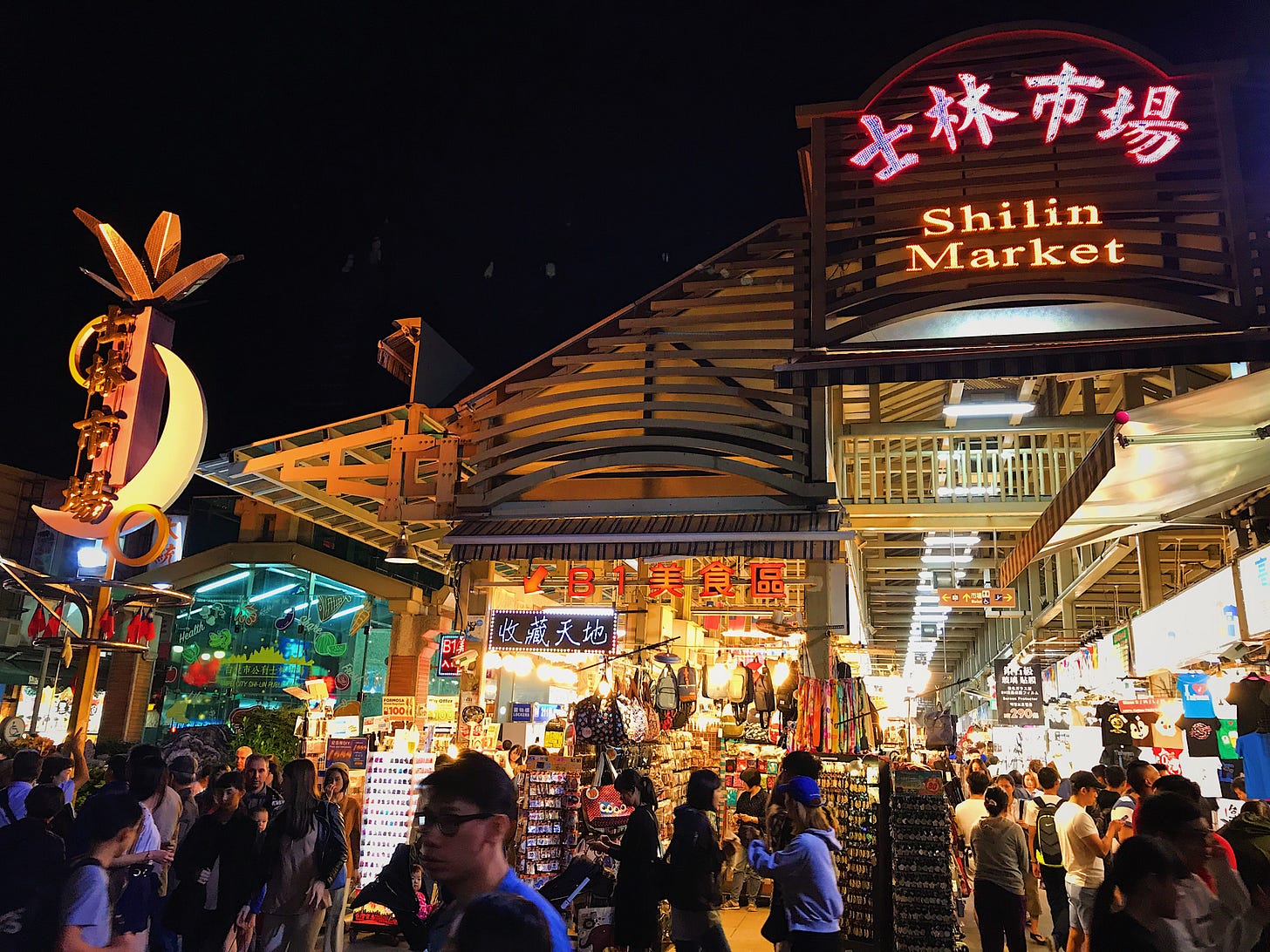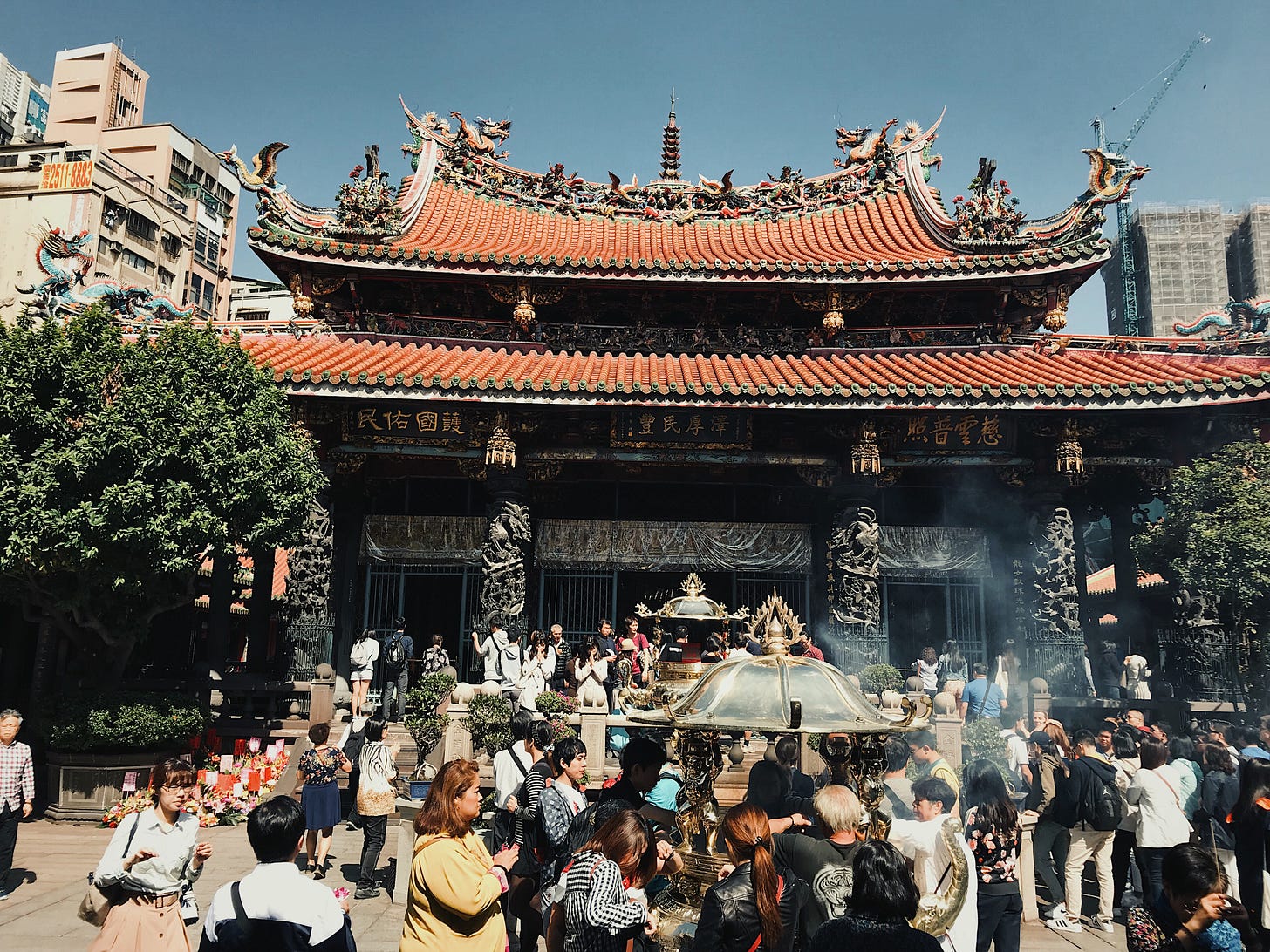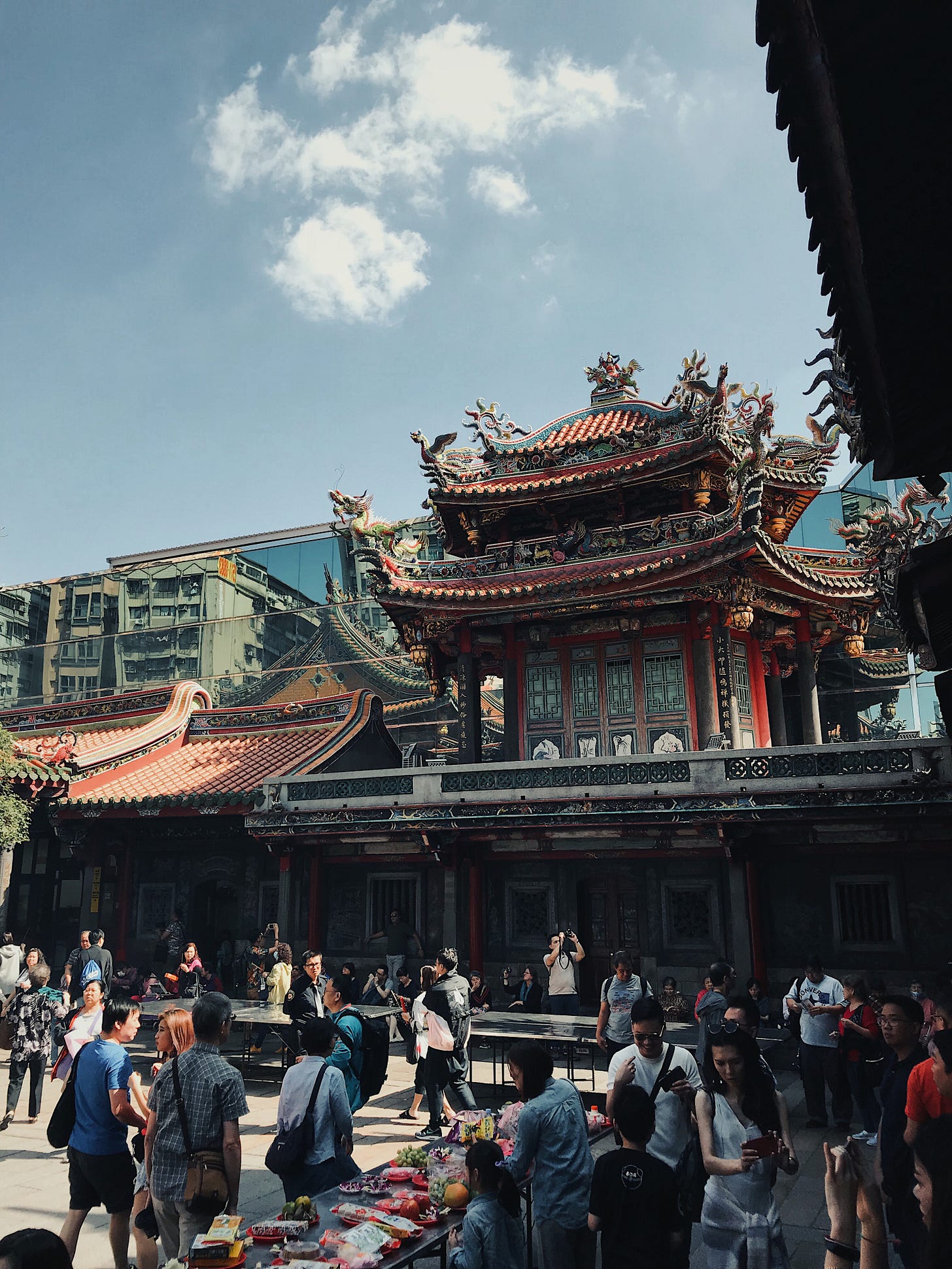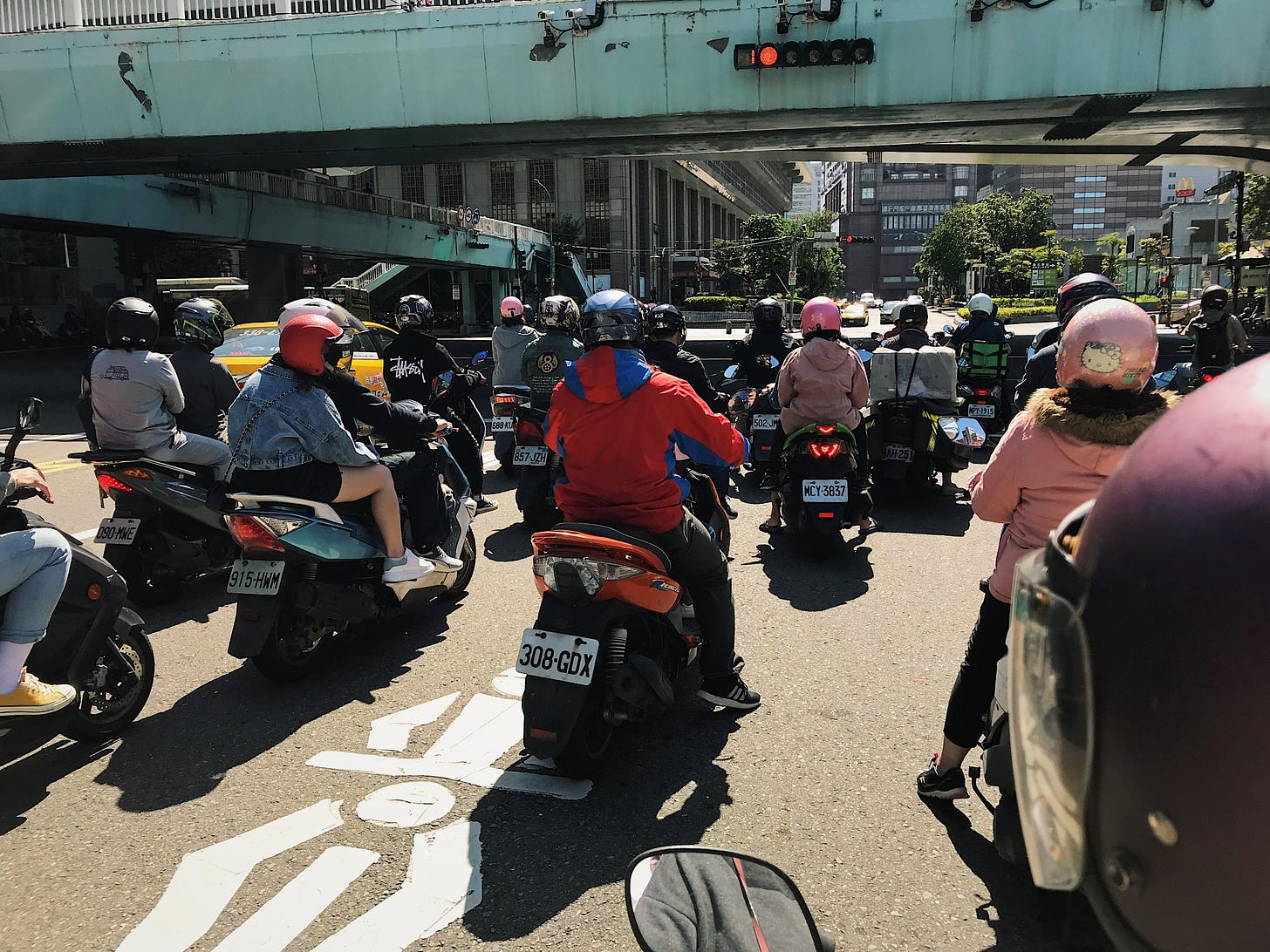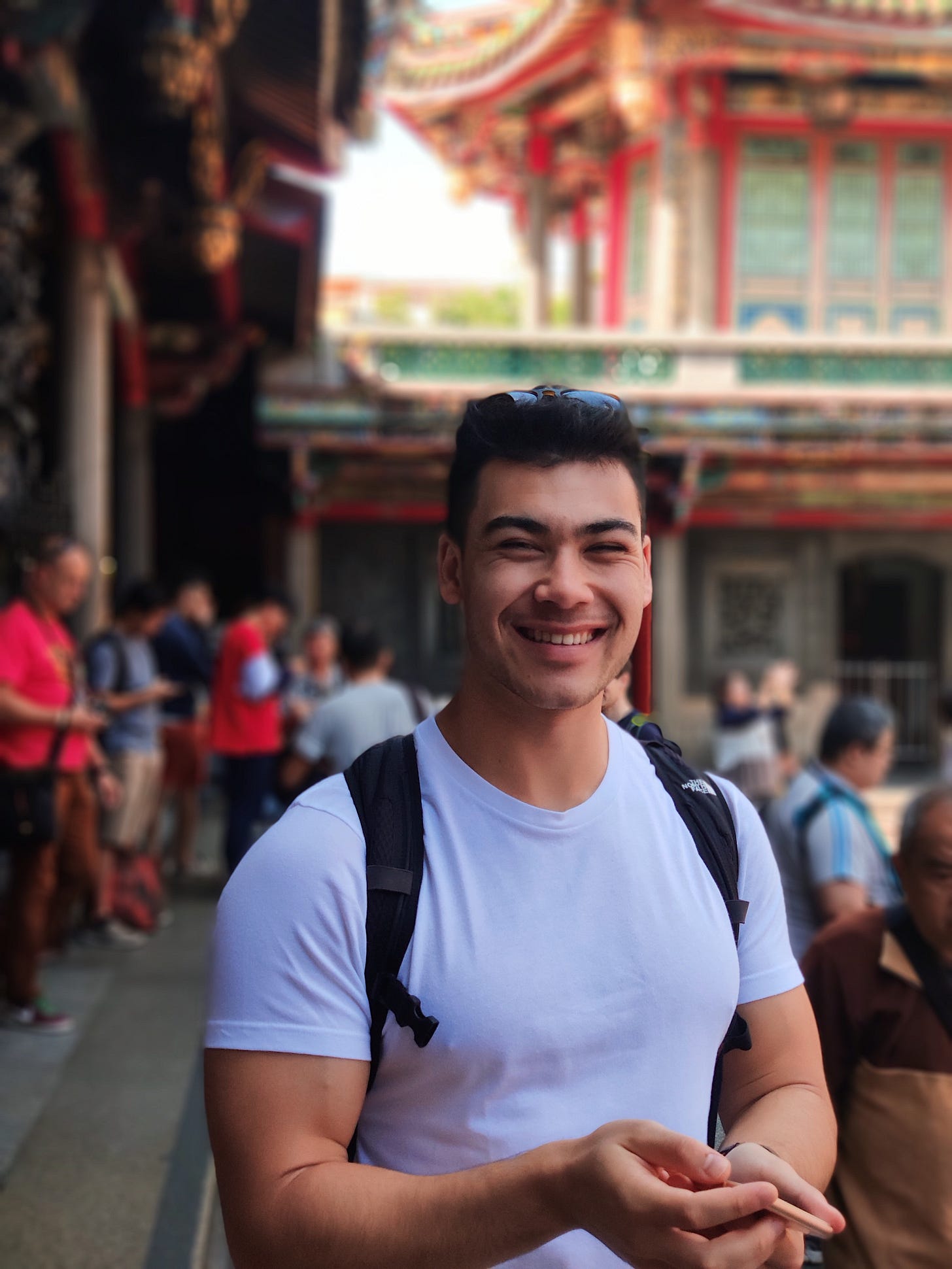Taipei: Part II
There is a popular, atrocious smell that I became familiar with at the Shilin Night Market in Taipei: stinky tofu. The malodorous, fermented blocks of bean-curd invaded my nostrils like they harbored a personal vendetta. Long before my eyes beheld the tofu, my nose was made acutely aware of their stench from afar. I stood in line for stinky tofu, suffocating with each dreaded inhalation like a condemned man breathing in the air of the gallows. It seemed the only justifiable fame this food should accrue is notoriety. I ended up backing out of line, unwilling to punish my taste buds with the flavor of the air redolent of stink.
There remained an endless variety of meats, vegetables, fruits, and unknown dishes up and down the market. I sampled voraciously. The unknown, foreign dishes far outnumbered the ones I could name. I saw meat cooked with what looked like a flamethrower; I saw oozing snails served over ice; I saw pink and blue potatoes on a stick served with sea salt. I lost track of exactly what type and how many foods I tried. I must have made more than a dozen separate purchases, though the total cost of my culinary excursion was ultimately less than twenty US dollars (one New Taiwan Dollar is worth 3.3 cents US Dollar). Food comes cheap in Taipei, street food even cheaper.
While the myriad of different foods was excellent, variety in itself is easy to find in any market (think about how many types of cereal you see in your neighborhood market). My takeaway was neither of a taste nor of a smell, but something of intuition. The thrill of the Shilin Night Market lies in the very vibrations that pulsate in every stall of every flavor, in every charred mark of flame upon animal flesh, in every cash-only exchange. It was the distinct tumult of a culture breathing in and out, quickly though unrushed and all at once. The throng sustained by proud vendors and satisfied patrons is what transformed a market into a destination and a destination into a landmark.
The Longshan Temple of Manka was as metaphysically provocative as the temples I’ve visited in Hong Kong. There were the classic upturned rooftops, kneeling monks, and piles of offerings. In tow was the controlled chaos that follows the herds of tourist filtering in and out of a place of worship. This temple was dressed with the sharpest colors and most saturated hues I have seen. Detailed, full-color statuettes of dragons and phoenixes perched themselves on the rooftops and overlooked the smoking incense rising up from below.
I was less impressed with the temple because I was still thinking about the manner in which I had arrived there.
The previous evening, I was very lucky to make a new friend in Taipei. A beautiful part of traveling to new places is the people you meet. My new friend graciously offered to take me around the city on her scooter (or, what is often called a “mo-ped” in America). When she first proposed this idea of me sitting behind her on the scooter, I was admittedly hesitant. All weekend, I had seen the ridiculous speed with which locals on scooters took their turns, seemingly speeding up when they saw a right-angle approaching.
Away we went nonetheless. I felt the wind whoosh in and out of my shirt sleeves and watched my own feet accelerate over the concrete that was inches below the soles of my shoes. As I stole hurried glimpses of the scenery rushing by on all sides, I found myself smiling underneath the plexiglass of my helmet mask—this is why I travel. There I was, sitting on the back of my new friends’ scooter—someone I met in a new country hours earlier—and we were on our way to local Taiwanese sights that I never would have known to visit myself. I was given a personal tour, and it was made even sweeter with the blossoming of a new friendship.
The Longshan Temple was our first stop in what was, in reality, a routine scooter ride through the city. But to me, I thought of it as an exhilarating high-speed escapade in a foreign land.
The novelty of being in a different culture, seeing local sights, riding a motorized scooter for the first time, and making a new friend all coalesced into a sweeping adventure that felt plucked from a movie and inserted as a chapter in my life.
I travel to try and taste novelty in its full flavor. Each destination adds a sliver of character to the perspective I’ll carry with me long after the trip has become an old memory, recounted and misdated like all blurry flashbacks are.
“Remember when I went to Taiwan so long ago? It must’ve been 2021. Or was that in 2015? Yes, 2015 sounds right…”
When I travel, the person I am when I arrive and who I am when I leave is always different. As slight as the change may be, it is there. I simultaneously undergo a layering-on and an exfoliation: new experiences build upon old, perspectives are refined, and preconceptions are shed like a brittle carapace.
In truth, there is little for me to say of Taipei that should be taken as a recommendation. If asked directly, I am not sure what I would recommend for sights or tastes or ambiance. This is by no means my attempt at a “how-to” guide for Taipei—my travels are not intended to be used as a cookie-cutter. I write to share the nuances of my individual experiences; I write to fill in the blanks to my own story. Whether there is any wisdom to be gleaned from my haphazard illustrations of where I travel, I cannot tell.
Nonetheless, travel remains a profound, individual experience that can create, reveal, and resuscitate. In Taipei and elsewhere, there have been instances where I stopped walking or eating or talking just to clasp my hands together, looking to grip the transient moment floating in my milieu, to try and feel what is fleeting. It is both physical and emotional. The geography blends with my psyche to create an impassioned, confused rapture, an exaltation most aptly described as freedom—freedom from your home, freedom from your environment, freedom from the expectations of your friends, freedom to meet new people, freedom from yourself.
Freedom with a capital F, without stipulation.
This is what I feel when I travel. Being my own self, unbounded and unabashedly so.
I have no doubt I'll return to Taiwan soon enough. Who exactly this "I" will be is something that I am happy remains unknown.


